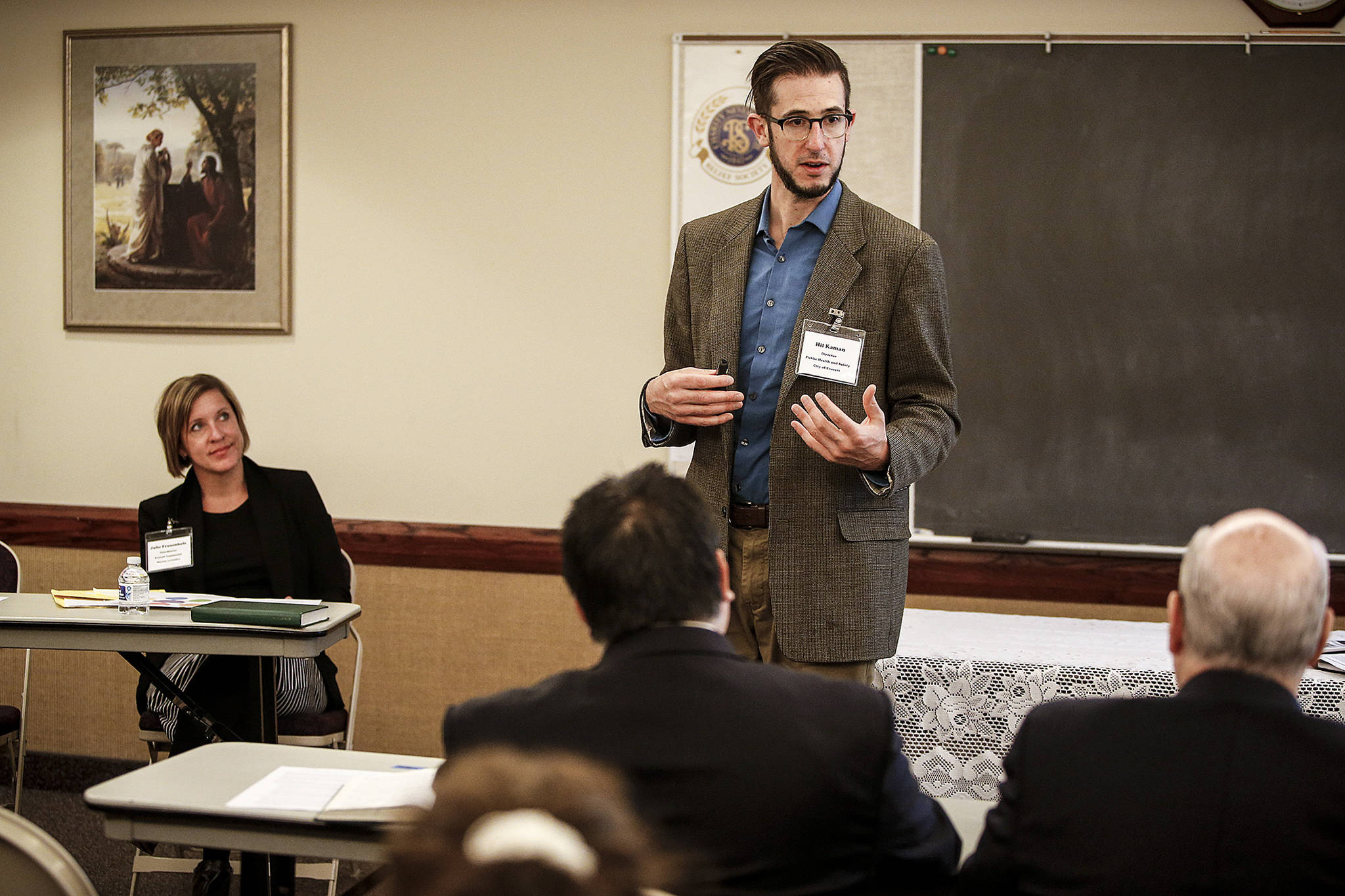ARLINGTON — Local leaders from the Church of Jesus Christ of Latter-day Saints recently decided they wanted to better understand homelessness. They felt it was necessary so they could be more effective in their mission to serve the poor.
So the Mormons turned to the city of Everett for help.
Church leaders occasionally organize panel discussions or presentations on timely social issues, said Natalie Lavering, a spokeswoman for the Arlington stake, an administrative division of the church composed of several wards.
The purpose is to educate ecclesiastical and public affairs leaders on those subjects.
“They’ll go back to their congregations and communities with better information,” Lavering said.
About 30 of those church officials came to Arlington for a presentation by Everett’s Public Health and Safety Director Hil Kaman and Community Streets Initiative Coordinator Julie Frauenholtz.
For Kaman and Frauenholtz, their talk was similar to the those they’ve given to others in the past year as part of the city’s ongoing community outreach about homelessness and related problems of substance abuse and mental illness.
For the LDS community, this was an opportunity to learn from those who jumped headfirst into tackling those problems. The group that gathered in Arlington came from Snohomish, Skagit, Whatcom and Island counties, and represented about 25,000 church members in the region.
“One of the key missions of the church is to care for the poor and needy,” Matt Latimer, the public affairs director for the church’s Everett Coordinating Council, said to the group.
“We know it’s a calling from the Lord himself and we need to strive to do better,” Latimer said.
Latimer drew from the biblical story of the Man at the Pool at Bethesda. The man, who was sick, told Jesus he had no one to help him into the pool’s healing waters.
“As we look to care for the poor and the needy in our community, there are many who have no one. And that’s part of our charge,” Latimer said.
Kaman outlined many of the steps the city has taken, starting with the convening of the Streets Initiative Task Force in 2014 and including programs ranging from the street cleanup program, embedded social workers in the police department, and how the city modeled its housing program on the largely successful initiative in Utah.
He also shared much of what he’d learned about homelessness and social services over the past several years. In that time, he transitioned from being a city prosecutor who put people behind bars to a public health official looking for ways to keep them out of jail and get them help.
“For each person who’s on the street there’s a very individualized reason why they’re there,” Kaman said. “It’s important to understand the role of trauma, both prior to it and the trauma of being homeless.”
Frauenholtz presented on some of the issues faith-based groups in particular face when working to address homelessness and other social problems.
One key point she made was for volunteers to be mindful of unintended consequences of their actions. People meant well when they brought meals to homeless people on the street in Everett, but that led to problems with garbage and vermin.
“There’s a lot of impacts that people often don’t think about when they’re trying to be kind and compassionate,” Frauenholtz said.
The church leaders took notes and followed the presentation closely. Their questions pointed to where they saw gaps in their own knowledge about people who are homeless.
“In about two hours they’ll be half a dozen sleeping around here,” said Trevor Williams, the president of the Arlington stake, motioning to the windows overlooking the parking lot.
Williams said he would have no trouble finding volunteers who would come talk to the homeless people camping outside. “But I don’t know how to tell them what to do” to help, he said.
Several people also said they wanted to develop better skill sets.
“We’ve got volunteers, but not the training,” said Eldon Vance, the public affairs director for the Everett stake.
Vance said he intended to follow up with two groups Frauenholtz mentioned: Everett Faith in Action, an interfaith group of church leaders that meets monthly, and Mercy Watch, a nonprofit that offers volunteers training in necessary skills to work with the homeless population.
“I want to help our members, starting with our leaders, starting with understanding the problem and finding where to have an impact,” Vance said.
Eric Jacobsen, the public affairs director for the Lynnwood stake, said his eyes were opened by the presentation.
“Service is a fundamental part of our church and it’s on all levels, for children, youth and adults,” he said. “It’s on us to go back to the leaders of our congregations.”
Lisa Jacobsen, his wife, added: “My takeaway is they have given us more information to focus our efforts on what really helps.”
Latimer closed the evening with a lesson from the Book of Mormon, asking the group to consider how their standing before God and their service work are interrelated.
“As we’ve learned tonight, we have to do that in a smart way, and a way that helps them, and not just us,” Latimer said.
Chris Winters: 425-374-4165; cwinters@heraldnet.com. Twitter: @Chris_At_Herald.
Talk to us
> Give us your news tips.
> Send us a letter to the editor.
> More Herald contact information.

























